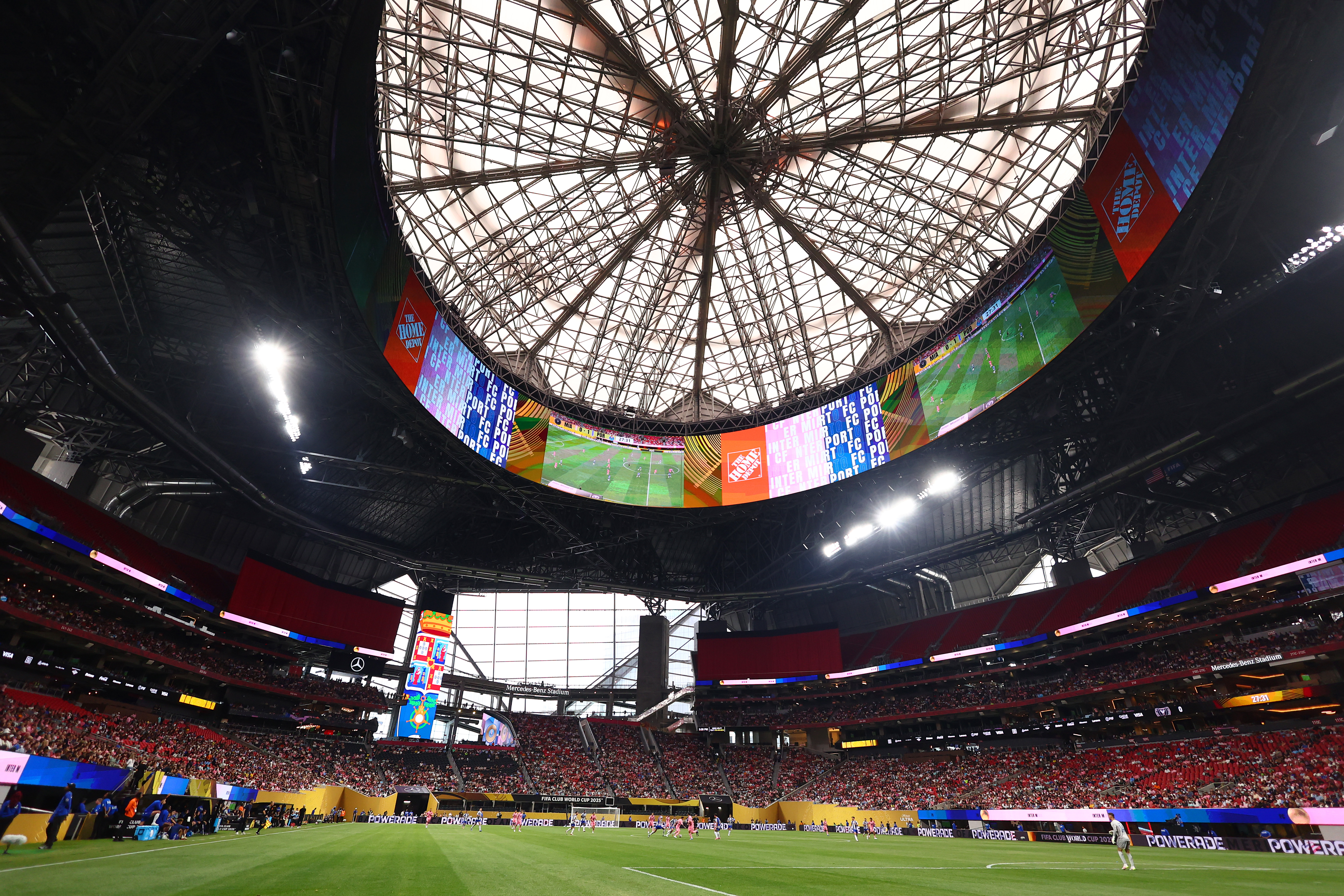Five reasons Spurs must start copying Arsenal
Matt Allen reels off the big reasons why Spurs could do worse than look to their north London rivals for inspiration...
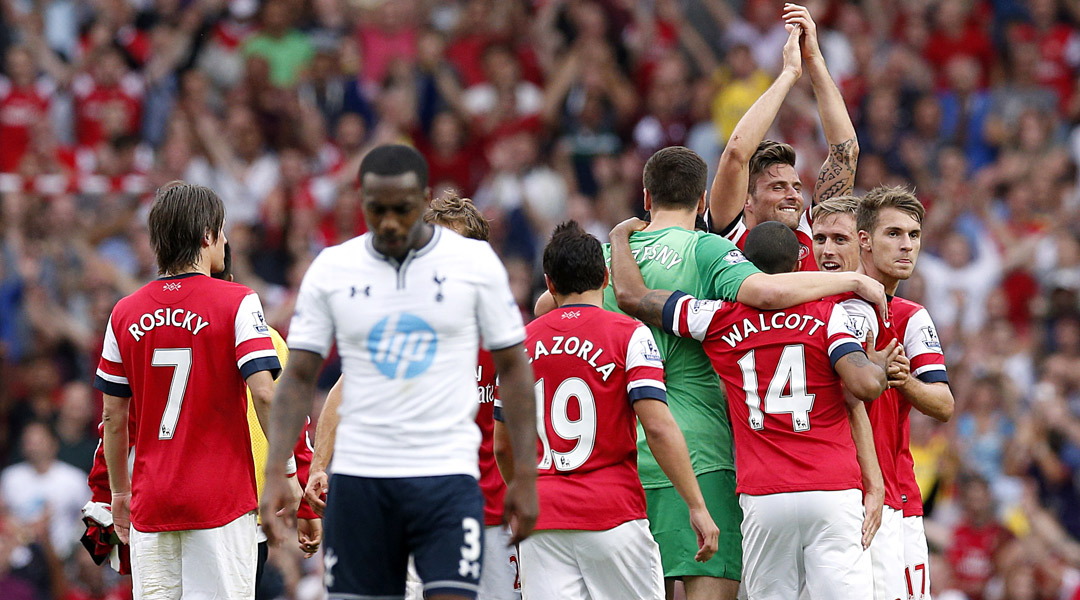
There's a saying that you make your own luck in life, and if that's the case, Tottenham Hotspur have regularly done their best to earn the bad beats, especially when it comes to qualifying for the Champions League. In recent years, they've been scuppered by a dodgy lasagne and watched, helplessly, as their manager, Harry Redknapp was distracted by the possibility of the England manager's job in 2012. That same year, their fourth-place finish was rendered fruitless as Chelsea jammed their way to a Champions League title with a distinctly underwhelming team; Andre Villas-Boas missed out on fourth by a point in 2012/13 despite earning the club's highest Premier League points tally.
These cruel twists have introduced a new term into the football vernacular: "Spursy"; to snatch defeat from the jaws of victory, in a slightly haphazard fashion. But to be "Spursy" is also to be tinged with jealousy. Neighbours Arsenal have qualified for the Champions League 16 years running. Sure, they might have missed out on the silverware their fans and increasing ticket prices demand, but they're always there or thereabouts in the title chase until the first shoots of spring signal an inevitable collapse. It's not quite the success the club would have hoped for, but aiming high usually results in failure - somewhere around fourth place, which is a bittersweet pill to swallow.
Spurs' recent thrashing at Chelsea was their modern incarnation in a snapshot. A temporary manager tactically holds Jose Mourinho's title-chasing side at Stamford Bridge before two slapstick tumbles from his players, a dubious penalty and a rush-of-blood-to-the-head backpass gifted four goals to their opponents. Very Spursy. However, by chopping and changing the manager at the merest hint of a slump, and employing interim managers, perhaps Spurs have become the masters of their own destiny rather than tragic victims of a defiant Lady Luck.
Certainly, Arsenal are doing things differently and getting their own way - 24 hours earlier they were dispatching Everton 4-1 in the FA Cup. But what exactly are they doing right? And what can Spurs learn from their bitter rivals?
The best features, fun and footballing quizzes, straight to your inbox every week.
1) Scrap the Director of Football
If Spurs chairman Daniel Levy should have learned one lesson by now, it's this: the Director of Football system simply doesn't cut it, not in the Premier League anyway. During his 13-year leadership, Levy has tried his luck with David Pleat, Frank Arnesen, Damien Comolli, and current incumbent, Franco Baldini, all with underwhelming results. Behind-the-scenes discontent and hefty managerial compensation packages have accompanied every appointment.
Early proof of the disconnect in this system was Comolli, who signed Darren Bent in 2007 when Martin Jol's squad already contained three prolific strikers in Jermain Defoe, Dimitar Berbatov and Robbie Keane. Jol had previously been left attempting to fill the Michael Carrick-shaped hole in midfield with Didier Zokora. A season later, the manager was given the boot, but not before the club had covertly wooed his replacement, Juande Ramos, a man they appointed on the recommendation of Comolli.
A lesson learned? Don't be silly. In the summer of 2013, Andre Villas-Boas requested only three signings with the money made from the sale of Gareth Bale to Real Madrid: the proven quality of Hulk, David Villa and Joao Moutinho; a little brawn, a little brains. Instead, Baldini delivered quantity: seven internationals from across the continent (and Brazil's Paulinho), none of whom carried any Premier League experience, and nearly all of whom seemed to fit a midfield brief of some description. AVB later joined Jol in an ever-growing list of aggrieved managers, albeit with a bulky pay-off.
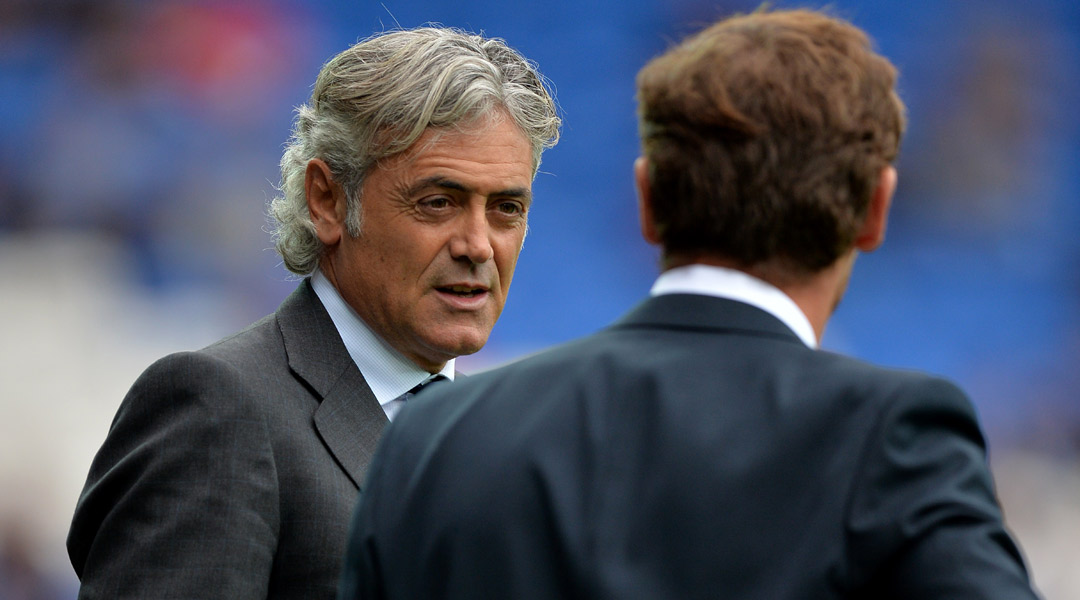
Arsene Wenger has resisted any efforts to remove the responsibility of player acquisition from his grasp. What initially looked like stubbornness, especially in the light of the club's failure to sign several touted, high-profile names such as Luis Suarez last summer, can currently be heralded as sagely wisdom.
“I would not work with a director of football because they buy the players and when it does not work you are guilty for not using them well,” he said. “I am not against having people to help me buy, sell and negotiate because I cannot do it all. But I think the final decision always has to belong to the manager to decide who comes in and who goes out because he is responsible for the style of play and results.”
There is some indication that Levy might have taken notes following the botched spending spree of 2013, however. Former scout Ian Broomfield has recently been re-signed from under the noses of Arsenal, who were set to offer him a contract at the Emirates. It was Broomfield who worked alongside Redknapp during the club's most successful spell in recent years (a Champions League quarter-final, without a DoF in sight) and later signed Jan Vertonghen and Hugo Lloris, the few examples of quality in an overloaded squad.
2) Find a leader
When Wenger signed Mathieu Flamini for his second spell at the club in the summer of 2013, discontented murmurs whooshed around the Emirates. Flamini, while being a midfielder of experience, expertise and considerable needle, was hardly the showroom arrival fans had been promised. Mesut Özil might have signed shortly afterwards for a club-record fee, but Flamini's signature confirmed a nagging suspicion that the manager was still reluctant to spend, despite the loosening of pursestrings at boardroom level.
Several months later, while hardly pushing the leaders in any Player of the Season nominations, Flamini has performed a functional role in key games. In his second debut against Spurs he dominated the midfield with crunching, decisive tackles and a spiky attitude. When players such as Özil have looked lacklustre, Flamini has delivered a metaphorical boot to the backside. He has, in cameo appearances, delivered something no Spurs player has been able to conjure this season: leadership.
Funny, but true story: in 2011, Redknapp wanted to sign both Phil Neville and Scott Parker. His thinking was that both players would add a steely attitude to a soft dressing room - experience and desire would compensate for their ageing legs while bringing some-much needed oomph to the team. Levy initially rejected the idea, only succumbing to the purchase of Parker when he won the Football Writers' Player of the Year in 2011.
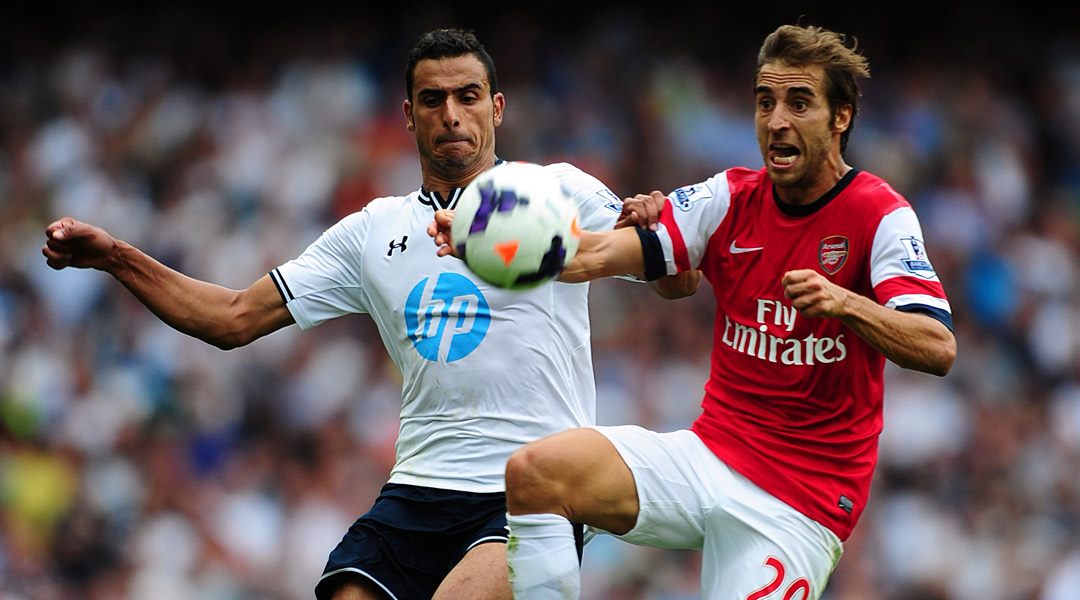
When Parker arrived, however, he delivered, coupling with Luka Modric in midfield to form an effective double act: Modric's incisive tempo control, twinned with Parker's grit and Dan Dare hair pushed Spurs towards Champions League qualification, and with style. It only ended in glorious failure once the England job became available and Redknapp refused to rule out his interest. The club went into a negative spiral and lost their 13-point lead over Arsenal.
Fast forward two years and current Spurs manager Tim Sherwood finds himself in a similar predicament. He currently coaches a team devoid of significant leadership qualities. "Lack of characters, too many of them too nice to each other," he said after the Chelsea capitulation. "You need to show a bit more guts and not want to be someone’s mate all the time. They need to drag it out of each other."
Only Michael Dawson possesses the true desire to lead the current team, though his occasional lapses in defence, especially when working in a high line, have caused looks of consternation from his colleagues, most notably the increasingly sulky Vertonghen. And when the fans are acknowledging Emmanuel Adebayor as a beacon of desire and leadership, trouble must surely be just around the corner.
3) Don't sign players in bulk
As Spurs sold Gareth Bale for a whopping £86m and bought in £107m of talent in the shape of Roberto Soldado, Christian Eriksen, Paulinho, Nacer Chadli, Vlad Chiriches, Etienne Capoue and Erik Lamela, pundits everywhere lined up to deliver a quickly cliched headline: "They've sold Elvis and bought The Beatles," proclaimed everyone from Garth Crooks to Peter Schmiechel. Sadly this was The Beatles in their cartoonish, Yellow Submarine incarnation, rather anything that could turn White Hart Lane into a cauldron of teenage delirium.
Almost from their drearily predictable 1-0 win at Crystal Palace on the opening day, Spurs struggled to find any sense of momentum. Players were placed in positions unsuited to their best assets; wingers were inverted, causing the likes of Andros Townsend to drift infield onto their preferred foot, congesting the midfield; the first-choice holding midfielder was a perennial conundrum and chances for £26m striker Soldado were few and far between. Disconcertingly, winger Lamela was stuck on the bench as if he was nothing more than a work in progress, albeit one that had cost £25.8m.
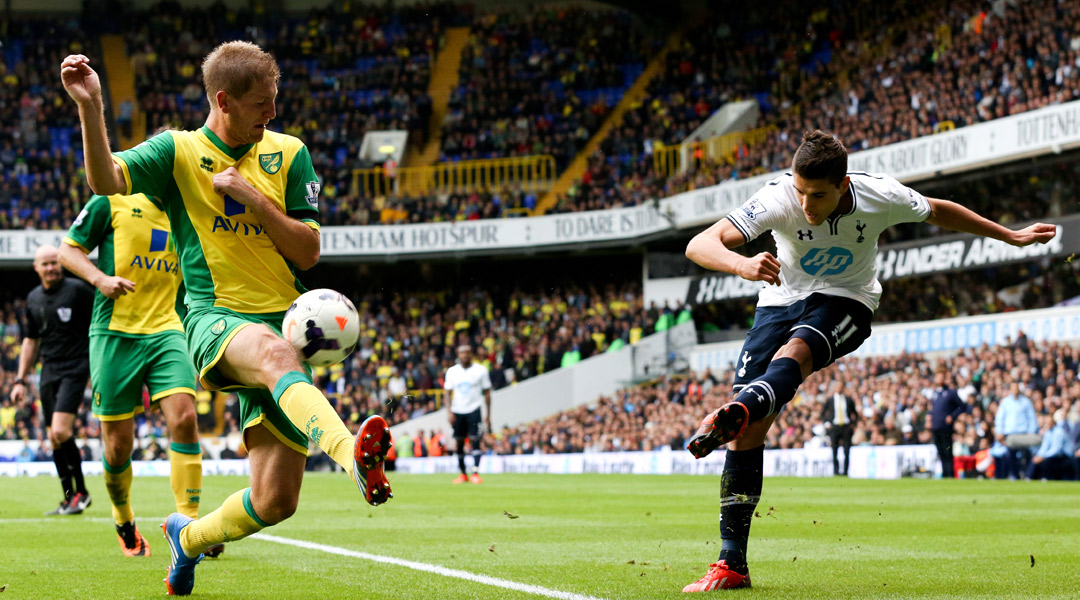
It was clear to everybody that nobody knew which players would click to provide Spurs' strongest line-up, least of all Villas-Boas. By the time of his sacking, which followed a 5-0 thumping at the hands of Liverpool at White Hart Lane, the manager was making veiled statements that not all of these players had been his signings. The new breed had been foisted upon him.
Compare this to Arsene Wenger's signing policy. The Arsenal manager has usually relied on tactical additions rather than annual, drastic wholesale changes. This M.O. has delivered contrasting results - for every Alex Oxlade-Chamberlain there is a Nicklas Bendtner - though the club's consistency has proved unwavering. Their final position for the last eight seasons reads: 4th (2013), 3rd, 4th, 3rd, 4th, 3rd, 4th, 4th (2006), though silverware has proven elusive.
4) Build a new stadium
It's the elephant in the room as far as Spurs fans are concerned, albeit an elephant which takes up a hell of a lot more space. Enough space to warrant the commission of large posters featuring an artistic impression of the new stadium which have been placed around White Hart Lane. "Look at our fancy new ground!" they seem to yell. "The one we haven't started building yet!"
The big problem for Spurs fans is that nobody outside the boardroom really knows what's going on with regards to the Tottenham Hotspur Stadium development. The project was given the green light in 2011, a new Sainsbury's (which comprises part of the development) has gone up quick-smartish, but not a brick has been laid towards anything resembling the dawning of a new football era. Meanwhile, Spurs blogs are awash with rumour; the board remain typically mute on the issue.
Click on to Google Earth and swipe your mouse south (not quite Woolwich, but near enough) and you'll see a gleaming aerial view of Arsenal's Emirates Stadium - a shiny superstructure of money-making brilliance. Since it was built in 2006, the 60,000-capacity ground has increased the club's matchday revenue from £37.4m to a figure in excess of £90m a year. Arsenal converted the old stadium into a housing project which made £157m in 2011. UEFA are currently heralding the development as the defining blueprint for other clubs to follow.
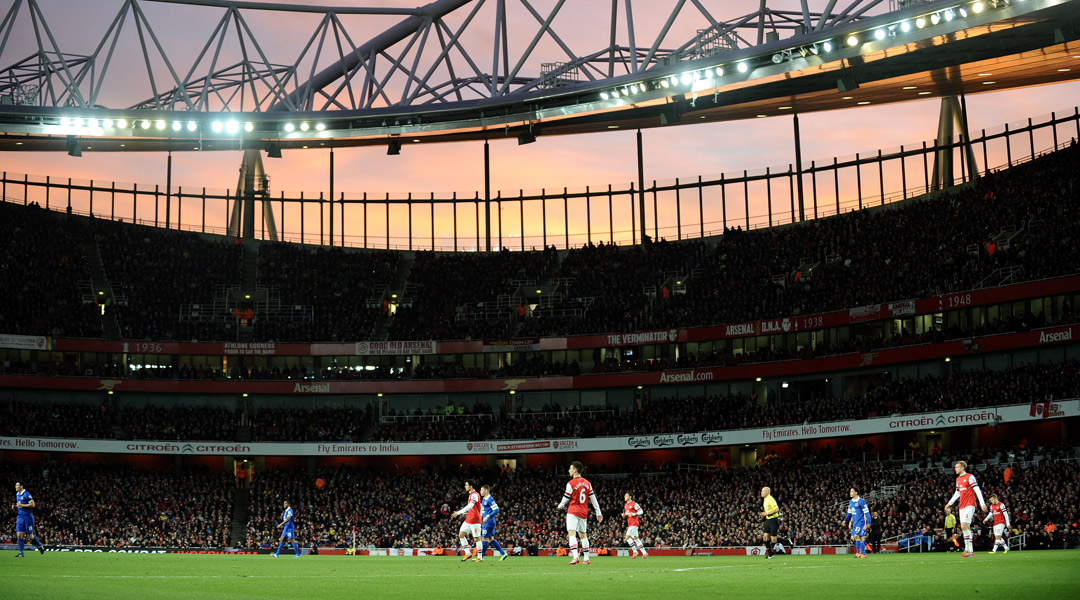
Currently, the en vogue podcast rumour is that Spurs have found themselves in a very modern catch 22 situation. Without the funding and prestige of Champions League football on a regular basis, they are unable to draw the financial investment and sponsorship required to build their reported £400m, 56,000 capacity stadium. Without their £400m, 56,000 capacity stadium stadium, they are unable to make the revenue required to pay the wages that's clearly needed to attract players with a calibre to ensure Champions League football.
So far, the only recent headlines regarding the development of the new ground have come from local businesses fighting any move to take their land in order to develop an "area-wide regeneration master plan" (which is still only a proposal). Meanwhile in a Guardian report dating October 30, 2013, a Spurs spokeswoman claimed that the club were confident of putting the construction out to tender at the beginning of 2014, and cranes would be on site by the end of the year. Hard hats at the ready...
5) Stick with a manager
To give you an idea of Spurs' revolving-door policy in recent years, try naming all the gaffers installed during ENIC's ownership in the last 13 years (answers below). Here are some clues: there's been 10 of them, and this number includes title-winners (not with Spurs), former international tacticians, stop-gaps, White Hart Lane legends, hang-dog "real football men" and Continental Bright Young Things.
Somewhat disconcertingly, Spurs' biggest successes came from managers that were either foisted upon them, or bucked the trend of continental-style management which seemingly holds sway at White Hart Lane. Martin Jol stepped into the breach after Jacques Santini left the club in 2004, and would have led the club to Champions League qualification had it not been for a dodgy lasagne that poisoned his squad on the last day of the 2005/06 season. Harry Redknapp was deemed an unfashionable choice on his appointment in 2008, yet he steered Spurs to the quarter-finals of the Champions League in 2010.
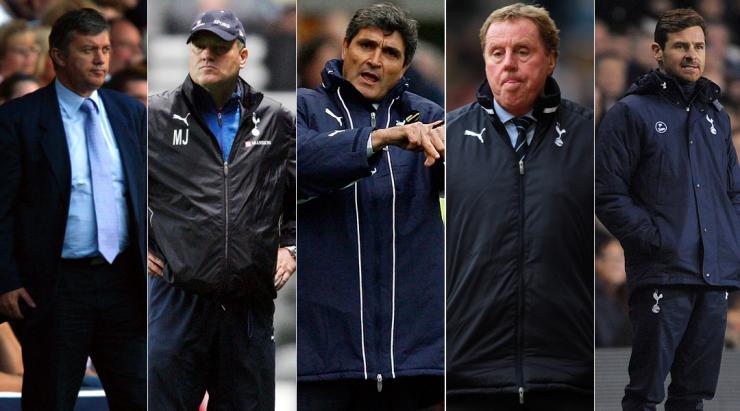
Contrast this with the position of Arsenal (time to look away Spurs fans). Arsene Wenger arrived in 1996, he has won three Premier League titles (that's three more than Spurs), four FA Cups and four Community Shields (hardly the Champions League, but you have to win something to qualify). Spurs, meanwhile, have won the League Cup twice in that time. Arsenal have qualified for the last 16 Champions League competitions, Spurs just once. Doesn't take a genius to work out that sticking is maybe better than twisting.
Answers: George Graham, Glenn Hoddle, David Pleat (caretaker), Jacques Santini, Martin Jol, Clive Allen (caretaker), Juande Ramos, Harry Redknapp, Andre Villa-Boas, Tim Sherwood.
